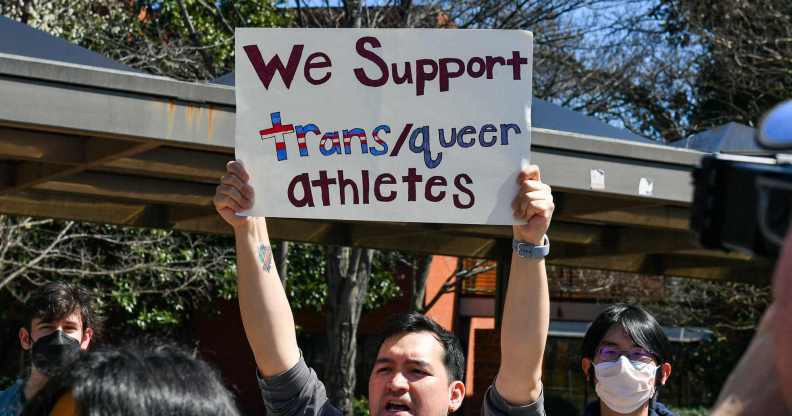UN experts call for trans inclusion in sport ‘without discrimination of any kind’

UN experts have called for trans inclusion in sport (Rich von Biberstein/Icon Sportswire via Getty Images)
A group of UN experts has called on countries, athletes and sporting bodies to respect the right of trans and intersex people to participate in sport.
Ahead of the Sporting Chance Forum, part of the United Nations’ year-long commemoration of the 75th anniversary of the Universal Declaration on Human Rights (UDHR), UN experts expressed “grave concern” over the structural barriers in sport faced by women and girls “in all of their diversity”, including lesbian, gay, bisexual, trans and other gender-diverse and intersex persons.
The experts’ policy position urges states, international sports associations, sports persons and other stakeholders to “protect and respect international human rights law and standards in the field of sports, without discrimination of any kind”.
The call comes at a time of heightened hostility towards transgender athletes, who have become the source of intense scrutiny and abuse.
An increasing number of sporting bodies have banned trans people from competing in categories that align with their gender, while some states in the US have barred trans youth from playing in teams – even just for fun – which match their gender.
“We note with concern attempts to use the male-female categorisation [of events] to argue for the
exclusion of trans women and women with intersex variations (or persons perceived as such)
from female categories.
“Categoric exclusions of trans and intersex women from women’s sports is a prima facie violation of human rights obligations under the principle of non-discrimination… [and] their right to privacy,” the experts said in a statement.
“We are deeply troubled by the accompanying, oftentimes offensive and even hateful, targeting of trans and intersex persons in social media and public discourse, especially as it links to their sense of self and bodily autonomy, as those actions impact their physical and mental integrity.”
Stakeholders in sport must cease targeting trans and intersex women under the guise of protecting women’s sports, remain committed to fairness of competition by considering relevant factors that “may impact participation of persons based on categories protected under international human rights law”, including sex characteristics, sexual orientation and/or gender identity”, the statement adds.
This includes the requirement to adopt human rights-based approaches in the evaluation of bids for countries which seek to hold global sporting events. This point is notable given that Saudi Arabia is set to host the men’s football World Cup in 2034, despite its poor human rights record and the criminalisation of LGBTQ+ people.
“We are convinced that sports have the power to change perceptions, prejudices and behaviours: it must not be used to reinforce them,” the experts continued.
“We therefore urge sporting bodies at the elite level to consider the implications of their decisions not only for LGBT and intersex athletes but, equally importantly, the impact that those decisions will have on LGBT and intersex persons participating in sports at all levels, as well as general social perceptions.”
While trans people, allies and LGBTQ+ sporting bodies welcomed the experts’ position, so-called gender-critical activists reacted negatively and described the UN as misogynistic.
In recent months, a number of sporting bodies, including Union Cycliste Internationale, Swim England and the Welsh Rugby Union, have banned trans women from competing in female categories – even though they have few or no professional-level trans athletes in their sport.
The debate around trans inclusion has become ever-more toxic with people openly abusing transgender people, pushing conspiracy theories and weaponising anti-trans narratives against women who are not trans.
How did this story make you feel?

